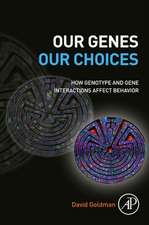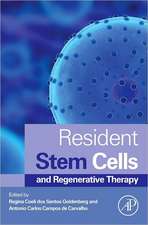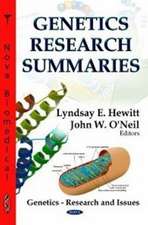Genetics of the Hungarian Population: Ethnic Aspects, Genetic Markers, Ecogenetics and Disease Spectrum
Editat de Andrew E. Czeizel Traducere de K. Sankaranarayanan Editat de Heide-G. Benkmann, H. Werner Goeddeen Limba Engleză Paperback – 22 iul 1991
Preț: 722.33 lei
Preț vechi: 760.35 lei
-5% Nou
Puncte Express: 1083
Preț estimativ în valută:
138.25€ • 143.77$ • 115.69£
138.25€ • 143.77$ • 115.69£
Carte tipărită la comandă
Livrare economică 14-28 martie
Preluare comenzi: 021 569.72.76
Specificații
ISBN-13: 9783540535805
ISBN-10: 3540535802
Pagini: 364
Ilustrații: XV, 344 p. 128 illus.
Dimensiuni: 170 x 244 x 19 mm
Greutate: 0.58 kg
Editura: Springer Berlin, Heidelberg
Colecția Springer
Locul publicării:Berlin, Heidelberg, Germany
ISBN-10: 3540535802
Pagini: 364
Ilustrații: XV, 344 p. 128 illus.
Dimensiuni: 170 x 244 x 19 mm
Greutate: 0.58 kg
Editura: Springer Berlin, Heidelberg
Colecția Springer
Locul publicării:Berlin, Heidelberg, Germany
Public țintă
ResearchDescriere
I am pleased to respond to the wish of the Editors, Drs A. Czeizel, H. G. Benk mann and H. W. Goedde and write the Foreword to this book "Genetics ofthe Hun garian population". This book represents the result of a fruitful international scientif ic cooperation, an endeavour that has been forged and sustained in the midst of a number of difficulties. It bears ample testimony to the fact that the pursuit of science transcends national boundaries and barriers and to what can be achieved through international cooperation. It has now become possible, among other things, to present a more meaningful characterization of the different ethnic groups than had been hitherto possible, thanks to the major advances in the study of human biology through the application of a wide variety of concepts and techniques. Several new disciplines, in particular, ecogenetics, pharmacogenetics and molecular biology have come into being and are flourishing. At the risk of stating the obvious, it is perhaps worth mentioning that the trends and place of migration and urbanization that we are witnessing today are such, that, before long, differences between different human gene pools may be substantially diminished, if not entirely obliterated. This book, therefore, is timely: it provides valuable information on who the Hungarians are, where they come from and where they are heading, in short, their past, present and future, in addition to presenting a broad perspective of some aspects of current research in biomedical sciences in Hungary.
Cuprins
1 Topics, materials and methods.- 2 The origins of the Hungarian population.- 3 Ethnic groups in Hungary.- 4 Anthropometrical traits.- 5 Blood groups and the results of certain blood group tests in Hungary.- 6 Genetic markers, serum protein and erythrocyte enzyme polymorphisms.- 7 Other traits.- 8 Ecogenetic and pharmacogenetic phenomena.- 9 The genetic polymorphism of adult intestinal lactase activity.- 10 Drinking behaviour and alcoholism.- 11 Psychometric traits.- 12 Disease spectrum.- 13 Comparison of allele frequencies in 24 genetic markers for 12 Hungarian ethnic groups and for 8 other non-Hungarian reference populations.- 14 Conclusions.











